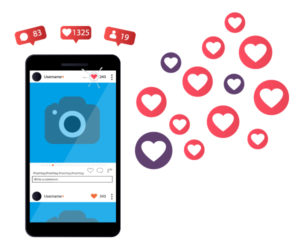PUBLISHED MARCH/APRIL 2019
by Anja Skrba, Content Creation Manager --

Anja Skrba
How can indie publishers use influencer marketing to their advantage?
Marketing your book on a tight budget is the stuff of nightmares. And it gets even scarier if you're promoting your first title, or if you're trying to write within a competitive niche. To make matters worse, even if you manage to land yourself a publisher, you'll find they often lack the resources to invest in novice authors.
The solution? Influencer marketing.
Influencer marketing helps bridge the gap between first-time writers or small independent publishers and their audience. Think of it like word-of-mouth marketing on steroids. There are a lot of unique benefits to influencer marketing, and you, as an author, can learn to leverage this technique successfully.
What Are the Benefits of Influencer Marketing?
There are several benefits of influencer marketing, but perhaps the most popular is its cost-effective nature--particularly in relation to paid ads and traditional marketing channels. After all, influencers are just individuals who work and/or are renowned in a specific industry. If you can find an influencer in an industry related to your book, you've hit gold.
The ROI associated with influencer marketing is also appealing. It's estimated that influencer marketing generates $6.50 for every $1 invested. Much of this has to do with the fact that influencers operate primarily through social media, and consumers who use these channels tend to be more affluent, motivated, and likely to recommend products to friends and family. It's kind of like being the popular kid on a private school playground.
The quality of the leads generated by influencer marketing is another major benefit. There are a staggering number of customers turning to social media before making a purchase. This is so they can solicit the opinion of friends, family members, and influencers, along with the celebrities that they follow through Twitter, Facebook, and Instagram.
While influencer marketing may have started with the traditional celebrity profiles you see on social media, most customers (particularly those who belong to younger demographic) now trust established industry experts over famous pop culture icons. In fact, 70 percent of teenage YouTube subscribers trust influencer opinions over the word of their favorite celebrities.
Finally, influencer marketing gives you the perfect opportunity to make your book seem relevant in the space you want to penetrate. When social media users see their favorite mini-celebrity posing with your book on Instagram, for example, they'll see exactly how your book fits into the bigger picture.
Using Influencer Marketing to Promote Your First Book

As we can see, the benefits of influencer marketing create a compelling proposition for those hoping to successfully promote their first book. But how exactly does it all work?
The concept is simple: You find those influencers and reach out to them with a valuable offer (cash or free copies, perhaps) in exchange for them reviewing about your book, or promoting it somehow on their social media channels.
The following three steps will help you map out the finer details.
1. Figure out the role of influencer marketing in your overall strategy.
It is never wise to become over-reliant on a single marketing channel, even when dealing with a cost-effective and seminal tool such as influencer marketing. Instead, you need to focus on developing an integrated strategy and determining the precise role that influencer marketing should play within this.
This will depend largely on the nature of your book, as some markets and areas of expertise rely more heavily on influencers than others. If you have a nonfiction title relating to beauty or cooking, for example, influencer marketing is likely to be prominent in your strategy, as both of these markets are dominated by influencer.
Reputable and popular influencers may be harder to come by for other authors, and in these instances, influencer marketing will be an important but slightly less central role in your overall strategy. By determining this from the outset, you can get the most from your marketing spend and optimize your ROI.
2. Scope out the best channels.
When looking to identify influencers through social media, it is important to target channels that are most relevant to your book's content, its niche, and audience. Although, there are some channels that have universal appeal due to their large user base and the real-time nature of conversations that occur there.
In this respect, Instagram and Twitter represent the two best places to locate influencers, build partnerships, and drive engagement with potential readers. Twenty four percent of U.S. influencers have highlighted Instagram as the second best platform for engaging audiences with a commercial proposition, whether you are looking to promote a product or a brand-new book.
Twitter also serves as an excellent real-time communication tool and platform wherein influencers find it easy to engage and interact with followers on an emotive level. This resource also offers an advanced search facility that makes it quick and easy to identify potential influencer based on their tweets alone, while it allows you to monitor keywords and phrases from your dashboard.
Facebook is also a widely used influencer platform, and one that 32 percent of influencers believe to be the best. The main reason for this is that influencer marketing provides the perfect complement for digital promotional techniques such as Facebook ads where you can invest a small amount in targeted, paid ads and use them as leverage to recruit relevant influencers and optimize your reach (and the appeal of your book, of course).
3. Use influencers to change perceptions and build your audience.
We have already touched on how influencers help you to engage your target audience, but it also has the potential for you to build your potential readership base over time. As long as you are open-minded and willing to make an investment in the form of time and free books, you can build a connection that enables you to challenge the perception of others and strengthen your proposition.
This relies as much on you as is it does your ability to find a seminal influencer, as it is your desire to interact with newfound readers that will ultimately determine how successful you are in leveraging the technique.
As an example, author Paul M. Barrett was able to reach out to both gun enthusiasts and critics after partnering with social media influencer Chris Abraham. When promoting his book
Glock: The Rise of America's Gun, he became active on gun message boards throughout the US and was able to trigger a number of emotive conversations in the social forum. This added depth and appeal to his proposition, while ensuring that he leveraged the reach of his influencer to its fullest potential.
This highlights the importance of fully engaging the potential readers that you are able to access through influencers, driving a higher ROI in the process. The key is to engage readers in conversation and challenge them on a topic that is central to your book, whether this is through real-time Q&A sessions on Twitter or through challenging video and podcast interviews that pose difficult questions.
Extra tip:
Influence.co is one of the popular connecting platforms for influencers, especially science fiction influencers. Also,
Goodreads is a great place to connect with reading enthusiasts and build your audience.
The Smart Book Marketing Move
As a first-time author or small publisher with limited resources, influencer marketing is the perfect way to connect with the masses.
Sure, influencer marketing is still an emerging marketing tactic, but it has already been embraced by brands and product-oriented businesses across the globe-and jumping on this digital bandwagon is now, in 2019, safer than ever.
Anja Skrba is a content creation manager for FirstSiteGuide, an educational website that provides tutorials and guides that help people create, grow, and maintain their online presence.